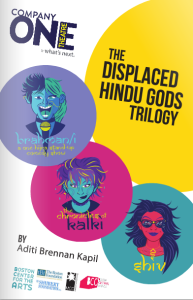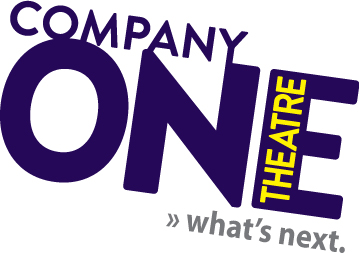 Get a sneak peak at THE DISPLACED HINDU GODS TRILOGY with the program flipbook!
Get a sneak peak at THE DISPLACED HINDU GODS TRILOGY with the program flipbook!
 Get a sneak peak at THE DISPLACED HINDU GODS TRILOGY with the program flipbook!
Get a sneak peak at THE DISPLACED HINDU GODS TRILOGY with the program flipbook!
Check out the presentation our Summer Production Apprentices did for the Company One Theatre staff, in which they talk about their journey and all the awesome work they did during their time here.
Dear readers,
We’re excited to announce that the rehearsal and production blog for Aditi Kapil’s DISPLACED HINDU GODS TRILOGY is up and running! The Trilogy runs at Company One Theatre Oct 24-Nov 22, 2014. Find out more about the production and teams by clicking HERE.
 From the Director of New Work
From the Director of New Work
Thank you for attending the Boston premiere of ASTRO BOY AND THE GOD OF COMICS created and directed by Natsu Onoda Power. We are so glad to have you with us for this genre-bending, imaginative theatrical event. I’d like to take this moment to tell you a bit about the path the play has traversed so far, its development through the XX PlayLab, and its presence in Company One Theatre’s larger community engagement work.
After years of developing ASTRO BOY’s central material through other projects and workshops, Natsu premiered the full version of the play at Studio Theatre’s 2ndStage in Washington, DC, where it was named one of the top three theatre experiences of 2012 by The Washington Post. Jamie Gahlon, the Associate Director of HowlRound (in residence at Emerson College), was a member of Natsu’s original ensemble in DC, and helped connect Natsu with Company One Theatre in 2013. Knowing that Natsu wanted to revise and expand the play, we invited her to participate in the 2013-14 XX PlayLab—a program collaboratively run by the Boston Center for the Arts and Company One Theatre, dedicated to propelling works by women to the stage. Past Company One productions that have emerged from the XX PlayLab include HOOKMAN by Lauren Yee (2012), and SPLENDOR by Kirsten Greenidge (2013).
Over the course of this season, Natsu and her longtime DC collaborators—projection designer Jared Mezzocchi, and actor Clark Young—participated in three workshops with the ensemble of Boston actors, dramaturgs Ramona Ostrowski and myself, and Assistant Director/Creative Consultant Jamie Gahlon. During these weeks, the cast and creative team worked on skill building, text revision, and interactive projection models.
Of particular interest for this collaborative team was training a new group actors in the performance techniques that have been a hallmark of Nastu’s aesthetic since her days as a graduate student at Northwestern University—large scale collaborative illustration, interactive stage animation, and an interest in where the scientific and the human meet. Company One Theatre also significantly expanded our own capacity for these techniques, and for the kind of innovative multimedia technologies that are Jared Mezzocchi’s unique specialty.
Together with the BCA, we mounted a series of public events in November and March, culminating in the XX PlayLab Festival in early June, which provided ongoing access to the piece-in-process. Furthermore, the ASTRO BOY ensemble has had an unprecedented level of involvement in community events around the city, thanks to The Mabel Louise Riley Foundation, which funded Company One to create a boundary-busting engagement initiative called the C1 Street Team, led by youth organizers. Our artists have participated in ASTRO-themed workshops for youth and families at Cambridge River Festival, Anime Boston, UMass Boston, and Figment Boston, and will be connecting with community groups serving local teens during the run of the production. Together, Natsu and Company One are excited to further expand the reach of our mission—the creation of civically engaged artists, and the production of theatre with a social impact.
A development process of this type is an uncommon opportunity, and we’re thankful to have a partner like the BCA working jointly towards the support of groundbreaking artists. Workshops and readings are important steps, but it’s production where playwrights discover most clearly the world they’ve created. ASTRO BOY AND THE GOD OF COMICS, like much of Company One’s work, incorporates a sense of magic, and a structure that breaks traditional narrative forms. We’re excited for the surprises that await audiences as the story of Osamu Tezuka, the creator of the character Astro Boy, is revealed in reverse chronological order. We are so happy to share this event with the Boston community, and hope that you find it as thrilling as we do.
Sincerely,
Ilana M. Brownstein, Director of New Work
A PDF of this letter can be downloaded by clicking HERE.
Lining up with our summer production of Astro Boy and the God of Comics, this New York Times article highlights the rise in print and digital comic book sales. Read the article here.
In his blog post, writer Patrick Gabridge analyzes how the Boston theatre scene has changed regarding new play development since 2010. He also posts the demographics of the playwrights and directors at each theatre. Read the post here.
This Stage Directions article talks about flying effects company Flying by Foy creating flying effects for shows produced at all levels, ranging from high school to Broadway. Read the article here.
On Feb 17, 2014, Peter Marks of The Washington Post hosted an event called The Summit — it was a public conversation with several of D.C.’s leading artistic directors. As Peter noted in an article for The Washington Post, “Several months ago, Molly Smith, artistic director of Arena Stage, approached me with an intriguing offer: organizing and moderating a series of discussions, with theater people and topics of my choosing, onstage before an audience at her theater.” It was the first of three planned public fora — the others are scheduled for March 24 (focusing on actors), and April 28 (playwrights and directors). The event with Artistic Directors was not livestreamed, but it was live-tweeted by several attendees, chief among them Elissa Goetschius, artistic director of Baltimore’s Strand Theater. It’s probably fair to say that no one involved expected the event to blow up twitter as it did that evening, nor to spark a renewal of the national conversation on gender parity and representation on American stages.
In an effort to capture the vast amount of conversation that evening on twitter, and to bank Elissa’s excellent live-tweet reportage, I created a Storify (a kind of twitter narrative) of the tweets using the hashtag #TheSummit, which you can find HERE.
There was a tidal wave of response to #TheSummit, and I’m using this space to attempt to catalogue it for future reference. If I’ve missed an article of note, please let me know in the comments section.
• Elissa Goetschius wrote a narrative account of The Summit for 2AMT: “Climbing #TheSummit”
• DC Theatre Scene’s account, by Brett Steven Ableman
• Brett Steven Abelman continued on the subject via his personal blog: “Season Programming and Personal Agency”
• MD Theatre Guide: “Through Lines: The Summit Part 1 — The State of Washington Theatre”
• Christine Evans: “Cumulative Advantage and Women Playwrights”
• WE EXIST, an open-source list of female playwrights, initiated as a response comments at The Summit that women playwrights weren’t “in the pipeline” that runs to major stages for production.
• Holly Derr for HowlRound.com: “The Myth of the American Theatre Pipeline”
• It was already in the works when The Summit happened, but Boston playwright Patrick Gabridge’s count of the Boston area theatre season (looking at gender and ethnic diversity for playwrights and directors) was well timed for this conversation. It’s in three parts: Part 1 (large and mid-sized theatres) — Part 2 (small/fringe scene & overall numbers) — Part 3 (New England theatre).
• This one preceded The Summit by about 2 weeks, but is topically related: Ms Magazine’s “Binders Full of Women and People of Color Playwrights”
UPDATE 3/17/14: Here are some additional, pertinent articles. Thanks to everyone for the links.
• Chicago Tribune: “In Chicago, Plays by Women, Bucking the National Trend”
• Philadelphia’s genre-defying performance group Swim Pony also took on #TheSummit
• Some context for Pat Gabridge’s Boston count (linked above) — here’s a count I did for Boston’s 2012-13 Season.
• Mike Lew was prompted by #TheSummit to address how “Arts Education Won’t Save Us From Boring Inaccessible Theatre.” And in case you missed it at the time, Mike also wrote wisely on gender parity in the theatre, back in June, 2013.
• Rick Davis on HowlRound: “Plays by Women: One Theater’s Story”
And for those who follow our C1 Intersection blog, you’ll have encountered these next two articles before — they touch on #TheSummit, and deserve a 2nd mention:
• Playwright Gwydion Suilebhan asks what we might mean when we say “gender parity.” And, here’s his count of DC theatre seasons regarding racial and gender diversity.
• Patrick Gabridge took on the topic of “Creating a Diverse World: Choices, Opportunity, and Trade-Offs for Playwrights and Theaters”
• Joel Brown in The Boston Globe framed the issues of The Summit in terms of Boston theatre: “Spotlight Shines of Area Theater’s Diversity Gap”
• BOSTON THEATRE TOWN HALL MEETING ON DEFINING GENDER PARITY: SATURDAY APRIL 27, 11A, AT BOSTON PLAYWRIGHTS’ THEATRE. Rsvp at the link.
— Ilana M. Brownstein, Director of New Work at Company One & Founding Dramaturg at Playwrights’ Commons
In this post on her blog, Creative Infrastructure, Linda Essig discusses the underpayment of artists, what qualifies an internship as paid versus unpaid, and how we need to value our artists’ time and work. Read the article here.
In a companion piece to Just Say NO!, Essig wrote Saying YES!, which talks about knowing when to say yes to an opportunity. Read the article here.